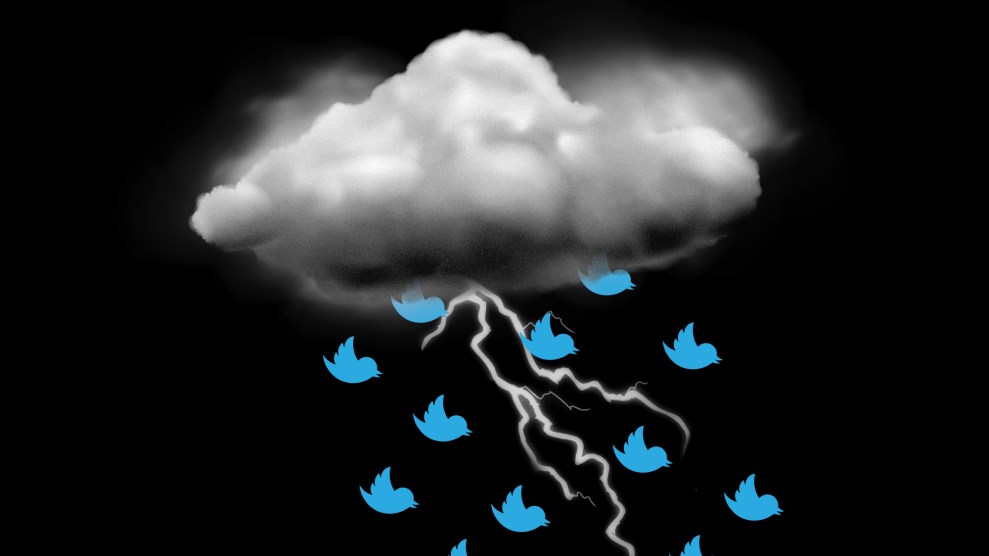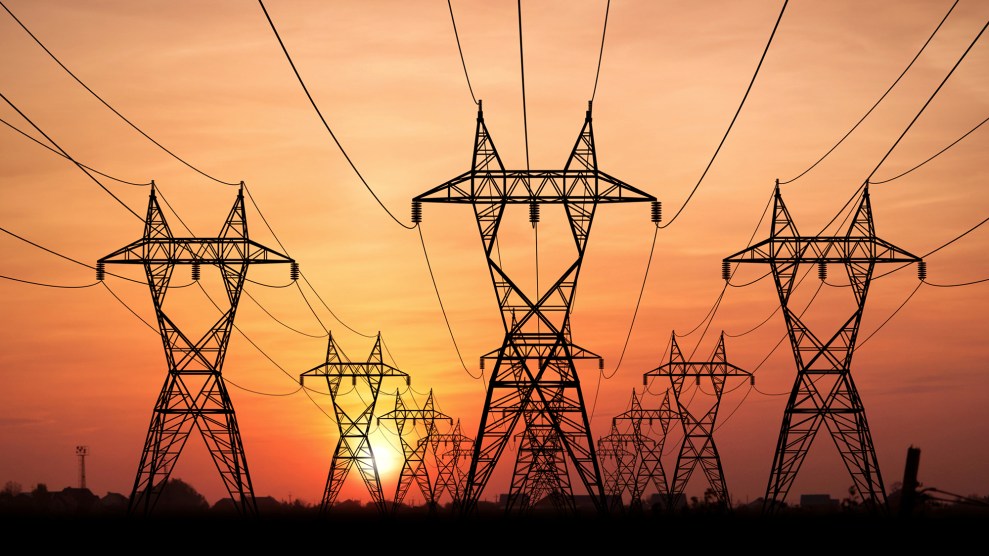
Grace Molteni/Mother Jones; Getty
This story was originally published by the Guardian and is reproduced here as part of the Climate Desk collaboration.
Twitter has proved a cherished forum for climate scientists to share research, as well as for activists seeking to rally action to halt oil pipelines or decry politicians’ failure to cut pollution. But many are now fleeing Twitter due to a surge in climate misinformation, spam, and even threats that have upended their relationship with the platform.
Scientists and advocates have told the Guardian they have become unnerved by a recent resurgence of debunked climate change denialist talking points and memes on Twitter, with the term #ClimateScam now regularly the first result that appears when “climate” is searched on the site.
Under the often chaotic leadership of Elon Musk, Twitter has fired content management teams, dismantled the platform’s sustainability arm, and lifted bans on several prominent users with millions of followers, such as Donald Trump and the right-wing commentator Jordan Peterson, who has espoused falsities about the climate crisis. The changes have been too much to bear for some climate experts.
“Since Musk’s takeover I have ramped down my own use of Twitter, using it less both to look for news and to share science,” said Twila Moon, a scientist at the National Snow and Ice Data Center who said she was worried that years of connections formed between scientists could “crumble” if trust in Twitter collapses.
“Folks noticing a rise in climate denialism and disinformation is particularly worrying and I am concerned that it could slow climate action in ways that are devastating to economies, communities, and health,” she said.
Michael Mann, a prominent climate scientist at University of Pennsylvania, said he has no immediate plans to depart Twitter but he’s noticed that climate disinformation has “become a bit more on the nose, with climate deniers who had been deactivated making a reappearance, and climate denial getting somewhat more traction.”
Mann has created a profile on Mastodon, a new social media site seen as an alternative to Twitter, and has been joined by a cadre of other climate scientists dismayed by Musk’s tenure. “I don’t think I’m getting much value from being on Twitter now, there are more interesting conversations happening at Mastodon,” said Bob Kopp, a Rutgers University climate scientist who expressed alarm at Twitter ending its policy on Covid-19 misinformation, which he said “tends to go hand in hand” with climate denialism.
Musk, a self-proclaimed defender of free speech and previously lauded by environmentalists due to his leadership of the electric car firm Tesla, has said that Twitter “obviously cannot become a free-for-all hellscape.” But his recent actions suggest “that he is interested in creating a massive, worldwide cage fight. If it comes to that, we’ll take a pass,” according to Ed Maibach, an expert in climate communications at George Mason University who claimed that many people in the climate community have discussed leaving the site.
There has been an uptick in Twitter content referencing #ClimateScam, “climate scam” or “climate is a scam” since July, three months before Musk’s $44 billion takeover of the site, with more than 500,000 mentions of these terms since then, according to an analysis by the Climate Action Against Disinformation coalition. The opaque nature of Twitter’s algorithm makes it unclear why this has happened, the coalition said.
“There’s no evidence there are more posts with ‘climate scam’ than ‘climate emergency’ or other terms, or that they are getting more engagement, so it’s a bit perplexing why it’s the top search term, we are scratching our heads at it,” said Jennie King, head of civic action at the Institute for Strategic Dialogue, part of the coalition.
“I can understand climate scientists saying this is not a productive place for conversations with each other any more. They’ve become lightening rods for hate speech and death threats, we are seeing a real escalation of threats against them, intended to drive them off the platform.”
King said there was a “renewed energy” coursing through the effort to spread baseless claims about the climate crisis on Twitter, particularly by high-profile accounts that fold the issue into other major clashes, such as over abortion or LGBTQ+ rights.
Peterson, the Canadian psychologist and media personality who was reinstated to Twitter by Musk following a ban, has recently become fixated upon climate change, often firing off a dozen tweets or more in a single day on the issue to his 3.5 million followers. The right-winger has shared debunked theories that excess carbon dioxide is beneficial to the world, that “automotive freedom” is under threat from efforts to reduce pollution from cars and that climate campaigners want to “wreak envious and narcissistic havoc.”
“Peterson is a big one because his brand extends beyond the environment but now he’s doubling down on climate,” said King. “We’ve seen time and again these accounts that espouse climate denial and delay also spread misinformation on other topics, such as electoral fraud, racial politics or reproductive rights.”
While false claims about the climate crisis have been deployed for decades by the fossil fuel industry and various conservative figures, there is some evidence there has been a rise in polarization over climate on social media over the past two years. A recent study by researchers in the UK and Italy found there was a fourfold increase in “contrarian” rightwing climate conversations on Twitter during the UN Cop26 climate talks last year, compared with the same summit held in 2015.
The increase in minority voices on climate, who make claims such as that people favoring climate action are somehow hypocrites or that reducing emissions is pointless or expensive, is being fueled by well-known rightwing politicians in the US and Europe turning their fire on climate activists who have become more prominent in recent years, the researchers said.
“We’ve entered a new era of conversation around climate change, where there is diminished trust and no interaction between groups who disagree,” said Andrea Baronchelli, co-author of the study and a researcher at City University London. “If you’re in one camp, you aren’t necessarily exposed to the views of the other camp, other than to mock them.”
For climate scientists, this breakdown has raised fears that previously mainstream online spaces like Twitter will be ceded to conspiracy theorists and others without any expertise of global heating. Kim Cobb, a climate scientist at Brown University, has moved to Mastodon, too, but lamented that it feels “fairly tame and pretty nerdy” compared with Twitter.
“As someone who followed lots of women scientists, and scientists of color, I’m noticing the absence of these treasured voices,” she said. “Maybe they’ve left Twitter, or maybe they’ve fallen silent, or maybe the network has deteriorated to the point that I’m just not seeing them being retweeted by mutuals. Twitter is a shadow of its former self when it comes to climate change.”











